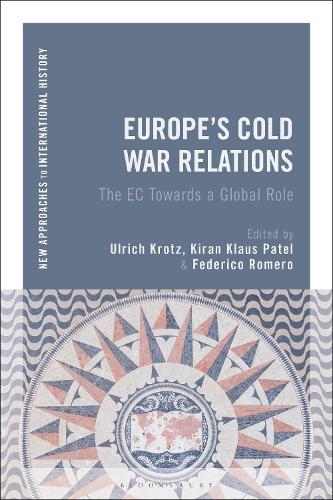
Europe's Cold War Relations: The EC Towards a Global Role
(Paperback)
Publishing Details
Europe's Cold War Relations: The EC Towards a Global Role
By (Author) Professor Ulrich Krotz
Edited by Professor Kiran Klaus Patel
Edited by Professor Federico Romero
Bloomsbury Publishing PLC
Bloomsbury Academic
29th July 2021
United Kingdom
Classifications
Tertiary Education
Non Fiction
Politics and government
327.4009045
Physical Properties
Paperback
256
Width 156mm, Height 234mm
440g
Description
This thought-provoking collection analyses the European Communitys external relations between 1957 and 1992, with a particular focus upon their broader impact and global significance. Reconceptualizing the long arc of the ECs international role, from its inception in the 1950s to the end of the Cold War, the chapters identify and assess the factors that either supported or impeded Europes international projection within this period. Organized into three parts, the authors investigate the ECs relations with key countries and world regions, discuss its activities within key policy areas, and offer reflections and conclusions on the various arguments that are put forward. Each chapter considers the entire period from 1957-1992 to identify and explain overarching trends, key decisions and historical conjunctions through scholarly literature, key debates and original discussion of each topic or policy issue. A final chapter situates the main findings within wider contexts, situating the EC in Cold War history. Bringing together international history and international relations, this project allows for cross-disciplinary dialogue and the careful discussion of key concepts, analytical approaches, and empirical findings. Filling a gap in our understanding of the early development of the ECs role as an autonomous global actor, this book holds important messages for the modern day, as the EUs position in global politics continues to shape the world.
Reviews
Europes Cold War Relations constitutes a significant contribution to interdisciplinary debates about the history and processes of European integration as well as about Europes role in world affairs. * H-War *
This is an important publication: a wide-ranging and much-needed study of the European Communitys external relations from 1957 to 1992. With contributions from leading experts, this book should be essential reading for anyone interested in the history of European integration and the development of the EC/EU as a foreign policy actor. * Luc-Andr Brunet, Lecturer in 20th-Century European History, The Open University, UK *
The volume represents not only an impressive contribution for the debate on the EUs foreign policy among scholars, but also for an overall reflection on its role in the international system. It is also an important teaching resource, and its particular format will certainly be useful for researchers and teachers in a variety of disciplines. * H-Soz-Kult *
A good, solid, and timely book on many of the European Communitys major relationships and policies during the Cold War. * Diplomacy & Statecraft *
The volume contributes to a better understanding of the conditions and substance of Europes Cold War relations and its international role on an empirical level and provides theoretical findings what drives international affairs since the second half of the 20th century. Hereby it is highly recommended to everybody interested in European integration history just as International Relations in general. * Journal of European Integration History *
Author Bio
Kiran Klaus Patel is Jean Monnet Professor of European and Global History at Maastricht University, Netherlands, where he also serves as the Vice Dean for Research. During 201415 he was the Gerda Henkel Visiting Professor at the London School of Economics and the German Historical Institute London, both in the UK. Ulrich Krotz is Professor at the European University Institute, Italy, where he holds the Chair in International Relations in the Political Science Department. He also serves as Director of the Europe in the World programme at the Robert Schuman Centre. Federico Romero is Professor of History of Post-War European Cooperation and Integration at the European University Institute in Florence, Italy. He is also one of two directors of the A. De Gasperi Research Center of the History of European Integration.
